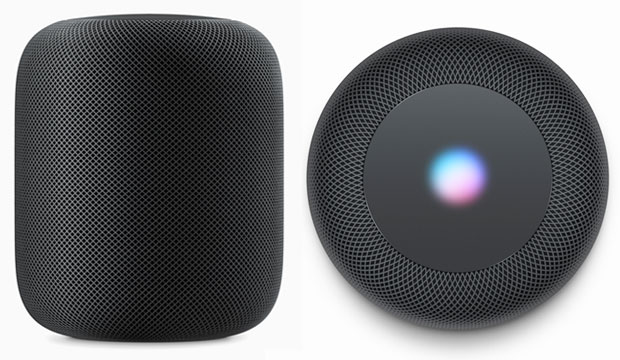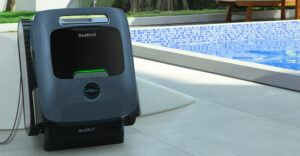HomePod, Apple’s long-awaited entry into the torrid smart speaker market, will be available Feb. 9, the company announced Tuesday.
The HomePod, which is not quite 7 inches tall, will be offered in white and space gray. It can be pre-ordered at Apple’s website for US$349 starting Friday.
Unlike other smart speakers, which support a variety of music services out of the gate, HomePod will support the Apple Music subscription service exclusively.
Although Apple Music has a catalog of 45 million songs, that limitation could curb initial sales of the product, noted Ross Rubin, principal analyst at Reticle Research.
“That puts something of a natural cap on it,” he told TechNewsWorld.On the other hand, “Apple doesn’t support any competing smart speakers with Apple Music,” Rubin pointed out, “so if you’re a subscriber to Apple Music, the HomePod is the best product to take advantage of that.”
Emphasis on Quality
The music knowledge of Siri, Apple’s intelligent agent, has expanded significantly, Apple noted. Among other things, Siri can learn someone’s musical preferences and tastes.
Still, Apple may be handicapping the HomePod out of the box.
“Apple is restricting Siri support for third-party applications, which may hamper growth of the product ecosystem and play as an advantage to competitors,” said Dina Abdelrazik, a research analyst with Parks Associates.
Where voice commands are processed for the HomePod also could be a problem for the product, she noted.
“Apple is shifting the processing of vocal commands away from the HomePod and onto an iOS device paired to the HomePod,” Abdelrazik told TechNewsWorld. “That opens up a realm of issues.”
For example, will the product be restricted to iOS devices? And will problems arise if the iOS device paired with the speaker is not in close proximity to it?
Advanced Audio Tech
HomePod has a number of technologies that contribute to its high-quality audio. Through software, it can do real-time acoustic modeling, audio beam-forming and echo cancellation.
It also supports spatial awareness — so wherever it’s placed in a room it tailors its sound for the best audio — and has a woofer designed by Apple to output deep, clean bass.
The unit has six microphones and the ability to obey spoken commands even when loud music is playing.
In addition to managing music, Siri can be used for a number of smart speaker tasks. It can send messages, set timers, play podcasts, and check for information on news, sports, weather and traffic.
It also can control smart home devices that support Apple’s HomeKit SDK and messaging apps that support SiriKit.
Later in the year, Apple plans to add multiroom support for the HomePod. That will allow commands issued in one room to be executed in other rooms containing HomePods.
Smarter Siri Needed
Siri’s performance on the HomePod is even more important than the audio quality of the device, maintained Bob O’Donnell, chief analyst at Technalysis Research.
“Apple has been highlighting the audio aspects of this, but at the end of the day, this really needs to be a good platform for Siri,” he told TechNewsWorld.”If the Siri experience isn’t much better than it is on an iPhone, people will be frustrated. I think that will be a significant challenge for the HomePod.”
Siri’s performance needs to be topnotch, or people interested in audio quality likely will seek other solutions, O’Donnell said, noting that “there’s plenty of audio-focused solutions from traditional audio makers that Apple would be hard-pressed to improve upon.”
Farsighted Strategy
Apple’s emphasis on high-quality audio could be a farsighted strategy.
“Agent functionality is being built into everything, so there’s less and less of a need for a dedicated smart speaker to provide the functionality,” said Reticle’s Rubin. “That means you’re going to want to compete on the quality of the audio, which has far more margin potential, even though that’s a crowded space, too.”
Even with a focus on audio hardware capabilities, the primary competitive ground for the HomePod lies in the functionality of Siri, suggested Jonathan Collins, research director at ABI Research.
“Increasingly, it will be the depth and power of each smart home voice control platform that will determine their appeal and long-term success,” he told TechNewsWorld.
One area where Siri may have an advantage over competitors is in language support. In an ABI study comparing Alexa, Google Assistant and others, Siri led the pack in multilanguage support, Collins noted.
Competitive Market
How does the HomePod stack up against the entrenched competitors in the market?
“It is one of the best products on spec, but it is by far the most expensive as well,” said Rob Enderle, principal analyst at the Enderle Group.
“The difficulty will be entering a market that is dominated by Amazon and largely exists under $200 with a product that is two to four times as expensive,” he told TechNewsWorld.
Coming to the party late hasn’t hurt Apple in the past — consider the iPhone and iPad — but this time things may be different.
“Apple was successful with the iPhone and iPad by redefining what a smartphone and tablet were,” Enderle explained. “This product is similar to what is already in a market defined by Amazon. So the mechanism for past success doesn’t seem evident.”























































